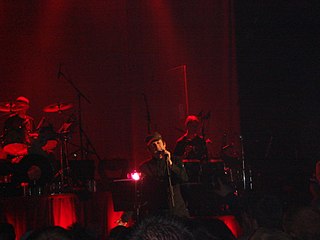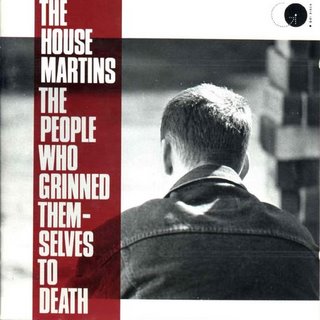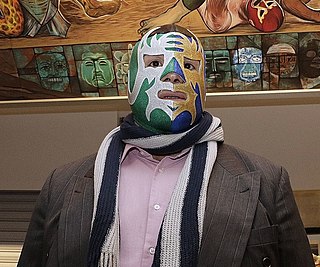Related Research Articles

The Beautiful South were an English pop rock group from Govan formed in 1988 by Paul Heaton and Dave Hemingway, two former members of the Hull group the Housemartins, both of whom performed lead and backing vocals. Other members throughout the band's existence were former Housemartins roadie Sean Welch (bass), Dave Stead (drums), and Dave Rotheray (guitar). The band's original material was written by Heaton and Rotheray.

Paul David Heaton is an English singer-songwriter. He was the lead singer and main lyricist of The Housemartins, who had commercial success in the UK and other European countries between 1985 and 1988 with several singles including "Happy Hour" and the UK number one single "Caravan of Love" in 1986, before the band disbanded in 1988. Heaton then formed The Beautiful South with The Housemartins' drummer Dave Hemingway in 1988, and the band's debut single and debut album were released in 1989 to commercial success. They had a series of hits throughout the 1990s, including the number-one single "A Little Time". They disbanded in 2007. He subsequently pursued a solo career, which produced three albums, and in 2014 he released What Have We Become?, a collaboration with former Beautiful South vocalist Jacqui Abbott. As of 2022, he has recorded four more albums with her: Wisdom, Laughter and Lines in 2015, Crooked Calypso in 2017, Manchester Calling in 2020 and N.K-Pop in 2022. Heaton performed at Glastonbury on 28th June 2024 with backing singer Rianne Downey. Earlier in June, it was announced on Heaton's homepage and on Heaton's official account on Twitter (@PaulHeatonSolo) that a new album, "The Mighty Several" will be released on Friday 11 October 2024.

The Housemartins were an English indie rock group formed in Hull who were active in the 1980s and charted three top-ten albums and six top-twenty singles in the UK. Many of their lyrics conveyed a mixture of socialist politics and Christianity, reflecting the beliefs of the band. The group's a cappella cover version of "Caravan of Love" was a UK number one single in December 1986.

London 0 Hull 4 is the debut album by The Housemartins, released in June 1986. It contains the singles "Flag Day", "Sheep", "Happy Hour" and "Think for a Minute".

The People Who Grinned Themselves to Death is the second and final studio album by The Housemartins. It was released in 1987, and produced three singles - "Five Get Over Excited", "Me and the Farmer" (#15) and "Build". The title song is about the British Royal Family, which found them gaining controversy in the tabloid papers similar to that of other bands such as the Sex Pistols, The Smiths and The Stone Roses.
Go! Discs was a London-based record label, launched in 1983 from offices in Wendell Road, Shepherd's Bush, by Andy Macdonald and Lesley Symons. The pair founded the label after Macdonald left his job as press officer at Stiff Records, and Symons provided the seed funding. The first signing to the label was Billy Bragg and early releases also came from Sheffield band The Box and Hull band The Housemartins. Records by the latter's spin-off group The Beautiful South were subsequently issued. Key staff contributors, following a move to Hammersmith, included comedian Phill Jupitus and Cathal Smyth. Go! Beat Records was launched as a subsidiary for artists like Beats International, Gabrielle and Portishead. In 1992, Paul Weller signed for the main Go! Discs label.
David Robert Hemingway is an English musician and songwriter, best known as a vocalist for the Leeds based band The Beautiful South until they disbanded in 2007. Previously he had been a member of The Housemartins.

"Caravan of Love" is a 1985 R&B hit originally recorded by Isley-Jasper-Isley, the second half of the Isley Brothers' 3 + 3 lineup of the 1970s.

"Dub Be Good to Me" is a song by British dub group Beats International featuring singer Lindy Layton, released on 24 January 1990 as the first single from their debut album, Let Them Eat Bingo (1990). It was written by frontman Norman Cook and interprets the SOS Band's 1983 hit "Just Be Good to Me", which it is named after. It also samples the songs "The Guns of Brixton" by the Clash, the Once Upon a Time in the West theme by Ennio Morricone, and "Jam Hot" by Johnny Dynell.

Soup is an album released in November 2007 by The Housemartins and The Beautiful South on Mercury Records. It is in effect a greatest hits album for both of the bands, the first seven tracks bracketed together as "The Housemartins Condensed" and the remaining fifteen as "The Cream of The Beautiful South". All twenty-two songs were released as singles by the bands, and the track listing runs in chronological order by year of song release from 1985's "Flag Day" to 2003's "Just A Few Things That I Ain't". An associated DVD of the bands' music videos was also released.

"Happy Hour" is a 1986 single by British indie rock band The Housemartins. It was the third single from the album London 0 Hull 4 and reached number three in the UK Singles Chart. Vocalist Paul Heaton had been working on the lyrics for some time, with the song originally being called "French England". It was completed on 22 January 1986, the same day "Me and the Farmer" was written. Guitarist Stan Cullimore had a chord progression planned for the verses, but wanted to finish the song quickly in order to go and buy some cakes, so he reused the same chords for the chorus and a quick demo was recorded, the whole process taking less than ten minutes.

"Flag Day" is the debut single released by British indie rock band The Housemartins. Released in 1985, it peaked at #124 on the UK Singles Chart, and a re-recorded version of it appeared on the debut album London 0 Hull 4. "Flag Day" also appears on the compilations Now That's What I Call Quite Good, Soup and as a shorter live version on Live at the BBC.

"There Is Always Something There to Remind Me" is the final single released by British indie rock band The Housemartins. An unfavourable account of Paul Heaton's schooldays akin to The Smiths' "The Headmaster Ritual", the non-album single was released in April 1988 as a 7" and a 12" and reached No. 35 in the singles chart.

Jesús Reyes González is a Mexican Luchador, or professional wrestler, best known under the ring name Máscara Año 2000 or Máscara Año Dos Mil. His ring name is Spanish for "Mask of the year 2000", originally referring to the mask Reyes wore while wrestling. Reyes was forced to unmask when he lost a Lucha de Apuesta to Perro Aguayo in 1993. Throughout his career Reyes has often teamed with his two brothers Carmelo, who wrestles as Cien Caras and the late Andrés, who wrestled as Universo 2000, the three were collectively known as Los Hermanos Dinamita or Los Capos when they teamed with Apolo Dantés. Reyes has earned the nickname "El Padre de más de 20" by wrestling commentators even though he does not quite have 20 children.

Ángel Omar Reyes Franco is a Mexican luchador, or professional wrestler, better known as Máscara Año 2000 Jr. He is working for Lucha Libre AAA World Wide (AAA), and International Wrestling Revolution Group (IWRG). Máscara Año 2000 Jr. originally worked under a mask and his real name was not a matter of public record, until he lost his mask in a match in August 2012. His father Jesús Reyes González wrestled under the ring name Máscara Año 2000.
Hijo de Máscara Año 2000 is a Mexican luchador enmascarado, or masked professional wrestler, currently working for the Mexican professional wrestling promotion Consejo Mundial de Lucha Libre (CMLL) portraying a rudo wrestling character. Hijo de Máscara Año 2000's real name is not a matter of public record, as is often the case with masked wrestlers in Mexico where their private lives are kept a secret from the wrestling fans.

The Star was a pub at 38 St John's Wood Terrace in St John's Wood, in the City of Westminster, London, for approximately 200 years before closing in 2015. The Westminster City Council listed it as an asset of community value. In 2017 it reopened as a gastropub.
Antonio Doncel is a Spanish retired footballer who last played for Bergantiños in his home country.
References
- ↑ https://www.officialcharts.com/artist/23094/housemartins/ [ bare URL ]
- ↑ Salaverri, Fernando (September 2005). Sólo éxitos: año a año, 1959–2002 (in Spanish) (1st ed.). Spain: Fundación Autor-SGAE. ISBN 84-8048-639-2.